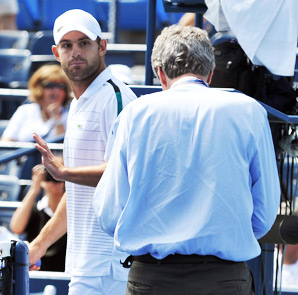U.S. Open organizers should wise up and bail on 'Super Saturday'
When is everyone going to realize that those days are gone?
We're no longer talking about Chris Evert-Martina Navratilova and John McEnroe-Jimmy Connors on a single bill. We're nowhere near a "tennis boom," rather suffering through a nationwide drought that finds tennis on the back pages and well out of the mainstream conversation.
If you stay current with tennis and its many informative websites, you're like me -- you don't get it. How could this sport ever get shoved to life's back burner? Just because it has become fully globalized, with no young Americans rocketing to superstardom, we're supposed to stop watching?
This is something I've never understood. If Alexandr Dolgopolov is playing Bernard Tomic in a televised match, I'll drop everything to watch -- far more readily than, say, John Isner-Sam Querrey. I'm all for intrigue and imagination on a tennis court, and it's an undeniable fact that most contemporary players who fit that category, both men and women, are not American. I'd like to think most devoted fans agree, that you're going to get a much better show from Francesca Schiavone or Agnieszka Radwanska than Melanie Oudin or Coco Vandeweghe.
But this isn't the world we're dealing with, and the people who control the U.S. Open schedule -- namely, the USTA and CBS -- are the last ones to realize it. That's why we're hearing all this "maybe" and "it's under consideration" when it comes to the tournament's future.
Have you ever heard players complain about the climactic rounds at Wimbledon? You haven't, because the ever-so-sensible All England Club places fairness above all other factors and refuses to be browbeaten by network television. The women play their semifinals on Thursday, get a day of rest, then contest a Saturday final. For the men, it's a Friday-Sunday deal.
Period! I mean, that's just the end of the argument. Super Saturday may have been a cool thing in its day, but it's a tedious, overblown spectacle now, a turnoff to most viewers and a blight on the players' health.
We wouldn't be hearing about a permanent switch to a Monday men's final at the U.S. Open if the corporate types could simply align with Wimbledon and take the route of fairness. The Open could be completed within a final-Sunday framework if it displayed a bit more urgency and tightened up the first-round schedules.
But let's just say the Monday men's final is adopted. Does that mean the Open goes dark on Sunday, so CBS can fully concentrate on the NFL's opening weekend? I'm sure the network executives have been ticked off for years about sharing the men's final with football; it's a mismatch tennis can't possibly win. So don't necessarily assume that both the men and women would have a day of rest between their semifinals and finals. Put your bets on greed, and assume CBS wants to keep "Super Saturday" intact, with the women playing the semifinals on Friday and the finals the next day.
I'd advise the CBS people to take a good look at the current rankings when it comes to assessing the tournament's future. Setting aside Serena Williams -- a hazy bet in her own right due to injuries and so many other factors -- how many American women have a realistic shot at playing in the women's final over the next 10 years? The other top-100 players are Christina McHale (42nd), Bethanie Mattek-Sands (54), Irina Falconi (76), Vania King (77) and Sloane Stephens (92). They've all had their moments in the majors, but huge television draws on the final weekend? That's pipe-dream territory. More likely, this will be the province of such names as Petra Kvitova, Caroline Wozniacki, Victoria Azarenka, Andrea Petkovic and the inevitable up-and-coming players from Europe, Asia and South America.
Similarly, the men's final weekend isn't likely to be a spin around the old American barbecue. Mardy Fish and Andy Roddick invariably fall short, the mid-level guys (John Isner and Sam Querrey) are far too limited, and for all the inspiration we've been given from the likes of Ryan Harrison, Donald Young and Jack Sock, can you envision any of them on a Super Saturday program in the near future?
I'd suggest that CBS and the USTA wake up to the fact that the United States isn't going to own its major, as it did for so many years, and that the globalization factor will only become intensified in the future. So what's the point in ticking off the players and appealing to a television audience that really isn't there by clinging to Super Saturday? Why not give the players a break and give the viewers four days of dynamite viewing, without unnecessary overload?
For my money, forget Monday. The day has a sublime association with tennis history -- thanks to the 2001 "People's Monday" final between Pat Rafter and Goran Ivanisevic at Wimbledon -- but in New York, it represents only a grim concession. The tournament won't lose a shred of its unique appeal if it starts thinking of the players first.





